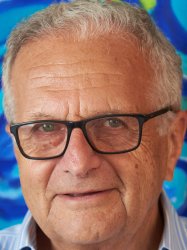Some Recent Selected Publications
Aleksander, I. 2017, Machine Consciousness, in The Blackwell Companion to Consciousness (eds S. Schneider and M. Velmans), John Wiley & Sons, Ltd, Chichester, UK.
Aleksander, I., 2013, Phenomenal consciousness and biologically inspired systems. International Journal of Machine Consciousness Vol. 5, No. 1 , pp 3-9
Aleksander, I., 2012, Design and the Singularity The Philosopher’s Stone of AI? Journal of Consciousness Studies, 19, No. 7–8, 2012, pp. 1-7.
Beaton, M. & Aleksander, I., 2012, World-related integrated information: Enactivist and phenomenal perspecives. International Journal of Machine Consciousness Vol. 4, No. 2 , pp 439-455
Aleksander, I., 2011, Workspace theories are alive and well. International Journal of Machine Consciousness Vol. 03, No. 02 : pp. 309-312
D. Gamez and I. Aleksander (2011). Accuracy and Performance of the State-based and Liveliness Measures of Information Integration. Consciousness and Cognition 20(4): 1403-24.
Aleksander, I., 2010, Does Sloman Criticise Sloman? International Journal of Machine Consciousness Vol. 02, No. 01 : pp. 19-22
Aleksander, I., Gamez, D. & Morton, H., 2009, Information or logic in modelling conscious systems. International Journal of Machine Consciousness Vol. 1, No. 2 , pp 185 - 192
Aleksander, I. and Morton, H. 2007. Phenomenology and digital neural architectures. Neural Networks 20(9): 932-7.
Current Work

Two major projects are being pursued:
1. Neuromodelling of Cognitive Phenomenology.
Cognitive Phenomenology (CP) is the philosophical postulate that phenomenal states exist when the meaning of something is being considered, when something is understood and when something is thought about. The controversy about this lies in whether classical sensory phenomenology covers these instances or whether CP is a distinct form. Our work favours the latter, and early results have been published and discussed at a conference.
2. Non-reductivity in machine consciousness.
Most claims to machine consciousness are reduced to algorithms that introduce a distinction in kind to events in the brain which are dynamic and emergent. Such algorithms fail to be explanatory of the mechanisms of consciousness and therefore have a doubtful future. We are reviewing the path of our non-reductive work based on dynamic neural systems in order to develop design strategies for machines that might actually benefit from being artificially conscious. This work is being written for publication and has been discussed at the 2017 Information Systems summit in Gothenburg.

